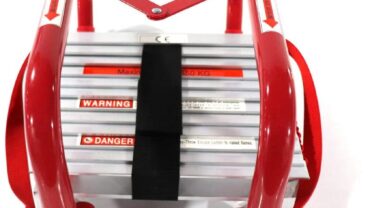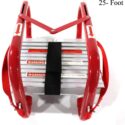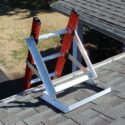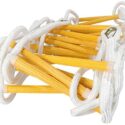Fiberglass Ladder Vs. Aluminum Ladder: Which One is Better?
From changing an electric bulb to redoing the walls of our rooms, a ladder is something we use very often. It makes them an absolute necessity of every household. While wooden ladders may be a cheap, go-to easy option for many of us, safety is something that can’t be compromised. It is worth doing our bones a favor and investing on a good quality ladder. It is natural to think of a good ladder hunt as an insignificant chore; it’s just a ladder after all, isn’t it? But if you aren’t careful and land yourself a wrong ladder, there are good chances you might end up in a hospital.
Technology sure does give many options, but for the sake of convenience, accessibility, and affordability, a premium aluminum or fiberglass ladder stands out in serving the purpose. If you cannot decide between the two, we are here with their pets and pitfalls to make your purchase decision easier.
Fiberglass ladders and Aluminum ladder are both excellent candidates for this buy. They each have their own merits and demerits.
So what’s best for you is more subjective to the following two questions:
(A) For what purpose are you buying them, and
(B) where exactly are you planning on using them?
In general, the Fiberglass ladder is electricity and heat-resistant, weather-resistant, and sturdier owing to their higher density. On the other hand, the aluminum ladder is light in weight, hence more portable and comparatively more affordable.
Purpose
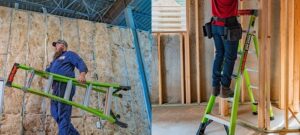
Fiberglass Ladder
A step ladder is a ladder that is used for medium heights. We are likely to use it more often than an extension ladder, which is used for higher purposes. Fiberglass has a higher density and is, therefore, going to be more substantial. However, the plus point is that they are weather-resistant, more sturdy, and insulating against electricity. It makes them safer and low maintenance. Aluminum ladders, on the other hand, are a lighter option. They aren’t usually insulating, but some companies go a step ahead and add a rubber stand-off to solve the issue.
Judging by this, if you are working alone, you might prefer Aluminum for an extension ladder. For a step ladder, however, fiberglass seems like a better choice.
Safety And Longevity
Aluminum is a metal. It leaves you under the danger of electrocution if extra precautions for its insulation have not been taken during manufacturing. It is easier to conclude that if you are someone who works a lot around electricity and live wires, you MUST choose fiberglass ladders. Aluminum ladders also just comparatively more malleable when compared with fiberglass. Therefore, fiberglass ladders have the upper hand at the sturdiness. It makes fiberglass ladders a safer option. Aluminum ladders also give quite some sturdiness provided that you stick to their high weight limit.
Fiberglass ladders aren’t prone to rust, which makes them more resistant to harsh weather. It makes fiberglass ladders low maintenance and more durable at the same time. An aluminum ladder can have a long life as well as provided that they are maintained well. On that note, we must not forget that fiberglass ladders are also prone to cracking. So under no circumstance should one neglect the weight limit.
We should also mention that fiberglass ladders are heat resistant, but aluminum ladders are not. Therefore, fiberglass ladders are less like to bend or deform under hot conditions.
Portability
As mentioned already, fiberglass has higher density; therefore, they are heavier, which can work for medium height ladders but not for higher ones. The higher the ladder, the heavier it is going to be.
Aluminum ladders are lighter in weight,

Aluminum Ladder
which makes them a wise choice for extension ladders. Their lightweight makes them easily transportable. So, if you need to carry the ladder from a place to another plan on moving aluminum ladders, clearly win this round. The lighter weight, however, does make these ladders a little shaky. Fiberglass ladders, being more substantial in weight, provide more stability.
Affordability
The price, along with the material, is also primarily based on the height of the ladder. If we keep the parameter of height the same for both of them a fiberglass ladder, in general, is always a tad bit on the pricier end. Their price, however, seems pretty consistent with their quality. That being said, if you are on a budget, you definitely should not feel like you are compromising quality with Aluminum ladders. Fiberglass ladders seem like a premium choice in some parameters, but Aluminum ladders are pretty safe and long-lasting. As long as your work does not require the ladder to be around a lot of electrical work, machinery, and live wires, Aluminum ladders should do just fine.
Let’s have a lookto the final pros and cons of fiber glass vs Aluminum ladder with clearer picture:
- Safety: Fiber Glass ladders offer more safety as compare to aluminum ladders.
- Durability: No doubt, fiber Glass ladders is made up of more durable material.
- Weather resistance: Fiberglass ladders
- Portability: Aluminum ladders are easy to carry and move wherever you want.
- Affordability: Aluminum ladders are more pocket friendly in compare to Fiber glass ladders.
Also Read: Different Types of Ladders: Their Uses and Benefits
Final Verdict
When choosing a ladder, safety needs to be a top priority since there are innumerable amounts of ladder-related accidents that can happen. A cheap option is not worth risking your life. That being said, safety is subjective for each one of us for an electrician. An aluminum ladder is a big no. However, if you are sure not to be under that danger, for example, in the packing and moving industry, for wood works and painting, an aluminum ladder is a practical choice.
If you can splurge a little and portability of the ladder is not a significant concern for you, a Fiberglass ladder is a hundred percent worth investing. But if you are on a tight budget or move around a lot, a good quality aluminum ladder can serve you well.
